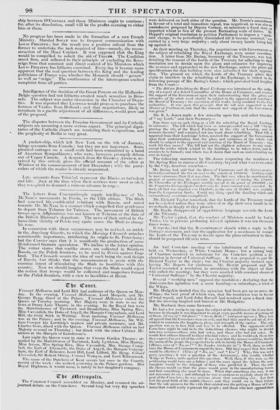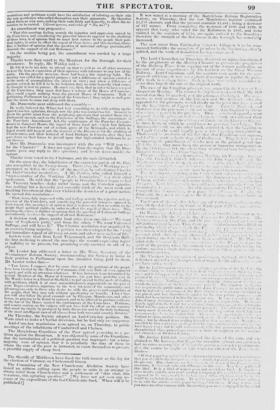An Anti Corn-law meeting of' the inhabitants of Finsbury was
held on 'Wednesday, at White Conduit House ; but a strong body
of' (21martists resolved to substitute for the Corn-law petition a de- claration in favour of Universal Suffrage. It was proposed to put Mr. Richard Taylor in the chair ; hut the Chartist majority insisted upon having Mr. Rogers for chairman. 31r. liewitt proposed and Mr. Taylor seconded a resolution in accordance with ,the object of those who called the meeting; but they were assailed with constant shouts of " Universal Suffrage :" by the Chartist majority.
Several "working men" opposed the resolution ; declaring that the Anti-corn-law agitatiou was a mere humbug—a subterfuge, a trick of the Whigs.
Mr. Hodgsk in denied that the mei:talon had been got up to serve the Whigs; the hest proof of which was, that the resolution was in favour of total repeal, and Lord John Russell had resolved upon a fixed duty. But the meeting laughed anti limited at Mr. Hodgskin.
Mr. Roebuck then came forward— He had a few words to say upon the subject of the abolition of the Corn-laws, because he thought it was hnportant to adopt every possible means of getting rid of them. (('ries of Sit down:" " Go to Aids .'' and gre«, uproar.) They were all agreed that the Corn-laws wire an evil; and that they utmost be got rid of, if we wished to maintain flue happiness, glory, and strength of the nation. The only question was as to how Hutt end Was to I:e effected. The opponents of the Corn-laws might be said to be the industrious classes; who might he divided into two sections—those who had votes, and those who had not votes. He would first address himself to those who had votes ; and he would ask them how they expected to get rid (tithe evil? it was clear that the answer would be, that by time ttniOn of the people they expected to la: able to terrify the House of Com MOW.% (11"", "" qt." Nis, 7I■11" 11"0 l'ank(e tricks Pr its.") Well, then, to Milo- mice the House of Commons to repeal the laws. :Did they expect that this mode would he effective ? (Cries " No, no," and " Fes.") Why, this was nut a party question ; it was a imestion of the Aristocracy, who would, whether -Whigs imu' Tories, unite against tliis question. Well, then, if this were so, thw petitioning wonld turn out a fitilare ; and the more signal time fitilure the more complete would be the triumph of those who predicted it. Then the mid- dle classes would see that the grass would grow in the manufbeturing towns, and that something else must he done. What that something else was, it Will not necessary to say ; and although he was as anxious us anybody about the re- peal of the Coro-law s, he was anxious about that soniething else. Let them test the good faith of the middle classes ; and they would sec in their failure, that the sole panacea for the evils that existed was the getting a House of Com- mons that would really represent the people; and those who now upposedthese resolutions and petitions would have the satisfaction of inlisting on their side the very gentlemen who called themselves now their opponents. He therefore asked them as wise men, seeking their ends fairly and honestly, to allow the re- s(Jlution to be carried. (Great uproar, awl cries of " No, no 1 '')
An amendment was proposed-
" That this meeting, feeling acutely the injustice and oppression caused by the Corn-laws, and considering the powerful interests opposed to the abolition of those laws, is of opinion that we must first restore to the people their poli- tical rights, in order to effect the repeal of those laws ; and tins meeting, there- fore, is further of opinion that the question of universal suffrage preihninently demands the support of all real Reformers."
On the motion being put, the amendment was carried by a large majority.
Thanks were then voted to the Members for the Borough for their attendance. In reply, Mr. Wakley said—
He felt it to he his ditty to attend on that as evil as on all other occasions to hear the honest expression of their ()pillions »ith reference to any law of the
realm. On the present occasion, there had been a fair stand-up tight. The meting was called for a special purpose ; but a difference of opinion existed as to the mode of accomplishing the object in view ; and \Olen a difference of opinion existed, he felt it to be his bounden duty to state honestly what emir,' he tlemght it best to pursue. Ile must sey, then, that in order to have a repeal of the Corn-laws, they must first have a relitrin of the House of C01111111,11-. Thev• could expect nothing from the present lIouse of Commons. Talk of petitioning Parliament for a repeal or the Corn-laws they might as well peti- tion the moon to come and sleep with them.
Mr. Duncomhe next addressed the assembly— He. really believed the Whigs bad lent something to do w•ith!fetting up the Anti-Corn-law agitation, though now the j..ke was carried too far. In Order to divert the politic mind from the perplexing questions that awaited t11,111 Avit,mm Parliament opened, such as the Extension uf the Suffrage, the amendment of the Poor-laws Amendment Act, the continuance of the Poor-law Coaunis- simmers in Somerset House, time repeal of those local acts which had hitherto kept time new Poor-law out of certain parts of the 31etropolis, and which he hoped would still keep it out, the demand of the Dis,t.mm. ars for the abolition of Church-rates, and their betrayal of Lord Durham in Canada, after thee had gone down on their knees to prevail upon that Ii iA-minded. nobleman to go out there— Here Mr. Duncombe was interrupted with the cry " Will you vire.; for the Charter?" It does not appear from the report that Mr. Dim- melte gave any reply to this question ; and he sat down amidst the
uproar. • Thanks were voted to the Chairman, and the mob dislianded.
On the calm me day, the inhabitants of the extensive pariah of St. Pan- cras assembled in time Vestry-room. There elso, the " Working ne....)
attempted to defeat rho object of the by substituting let
for A mist 'urn-law resolutions. A Mr. l',,rtloo, who called himself a "representative of the Worhing Men's Association," 'a-as their chief stedsesinfin. He said that the " people in Ibet-eine Street Logan to feel the Treasury benches shake under them, awl the Ciem-law agitation was nothing but a daatardly and cowardly trick of the most weak and sneaking Government that ever wielded the destinies of a great nation. He moved this resolution- " That, being duly impresseml with, and feeling acutely the injustioe and imp- presAmm of the Corn-laws, mold con,ideming the powerfid interests ,,pposed to their repeal, this meeting of opinion that it is IleCe,1:11'y fIrq tO to the people their political rights, in order to effect the repeal of thus,: laws. This meeting, tilt refore, is further of opinion that time question of Universal Suffrage pr.:Z:116mm ly .leserves the support of all real Reformers." A division took place, amidst loud cries fconi one id,--" We want none of SiephellS'S party," awl from the other, " We want Universal Suffrage. and will have it." The Chartist resolution wets negatived hy an overwhelming majority. A petition was then :clouted fit.; the " total and immediate repeal of all taxes on corn and other nee- •sa-ies of
Letters were read from Lord Teignmonth and Sir I■t•lij:!111111 ; time first declining to attend the meeting ; the second expressing regret at inability to be present, but promising every exertion in aid of its ohjeet.
Mr. Leader has addressed a letter to Mr. West, Seeretary of the Westminster Refitrin Society, recommending the Society to insist in their petition to Parliament upon due attention being paid to them. Mr. Leader writes thus-
" Yon klIONV. I suppose, that for some time trist the petitions of the people have been treated by the !louse of Commons with very little of even apparent respect, and with no attention whatever. It has, however, lien drterminol. hy SCrentl MemherS of the House or Commons, (as you have prolmably seen in Mr. Ward's letter to a friend at Sheilield,) to put an end to this mole of dealing with petitions, which is at once unconstitutional, unjustifiable on the part of your Rem.esentatives, injurious to time he,t interests of the community tulvantAgeoug only to those who tirsire to stifle the prayers and complaints of the people, that they may rule tvithont questioning or trouble. 1 truit flair you will also follow the good example set by Glasgow, Manche,ter, awl 0ther towns, in praying to be heard by counsel, and to be allowed to produce evidemme at the llar of the !louse against the continuance of the Corn-laws. Pet it ions, and a niers :notion on the subject, will not have half the effect on the country that must inevitably be produced bv daily discu,-ion and by the daily te,timony of the tnitst intelligent men of all ccas,es from lot hi town and country district s.- On Thursday, the Society adopted an Anti-Corn-law petition. Dr.
ade tried to make a Chartist diversion, but he had only one supporter.
Anti-Corn-law resolutions were agreed to, on Thursday, in public meetings of the inhabitants of Camberwell and Chelsea.
The Marylebone Guardians of the Poor agreed yesterday to a pe- tition against the Bread-tax. It was objected by some of the Guardians, that the introduction of a politival question was improper ; but a large nuijority were of opinion that it is peculiarly the duty of those to whom the care of the poor is intrusted, to exert themselves to procure a plentiful supply of cheap finel.



























 Previous page
Previous page